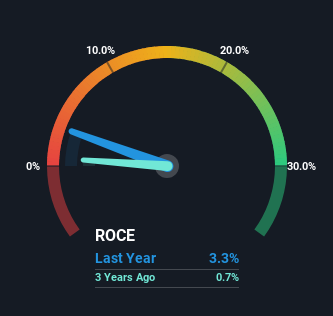Auckland International Airport's (NZSE:AIA) Returns On Capital Not Reflecting Well On The Business
What trends should we look for it we want to identify stocks that can multiply in value over the long term? Firstly, we'll want to see a proven return on capital employed (ROCE) that is increasing, and secondly, an expanding base of capital employed. If you see this, it typically means it's a company with a great business model and plenty of profitable reinvestment opportunities. However, after briefly looking over the numbers, we don't think Auckland International Airport (NZSE:AIA) has the makings of a multi-bagger going forward, but let's have a look at why that may be.
Return On Capital Employed (ROCE): What Is It?
Just to clarify if you're unsure, ROCE is a metric for evaluating how much pre-tax income (in percentage terms) a company earns on the capital invested in its business. The formula for this calculation on Auckland International Airport is:
Return on Capital Employed = Earnings Before Interest and Tax (EBIT) ÷ (Total Assets - Current Liabilities)
0.033 = NZ$359m ÷ (NZ$11b - NZ$567m) (Based on the trailing twelve months to December 2023).
So, Auckland International Airport has an ROCE of 3.3%. In absolute terms, that's a low return and it also under-performs the Infrastructure industry average of 4.7%.
Check out our latest analysis for Auckland International Airport
In the above chart we have measured Auckland International Airport's prior ROCE against its prior performance, but the future is arguably more important. If you'd like, you can check out the forecasts from the analysts covering Auckland International Airport for free.
What Can We Tell From Auckland International Airport's ROCE Trend?
On the surface, the trend of ROCE at Auckland International Airport doesn't inspire confidence. Around five years ago the returns on capital were 5.5%, but since then they've fallen to 3.3%. Although, given both revenue and the amount of assets employed in the business have increased, it could suggest the company is investing in growth, and the extra capital has led to a short-term reduction in ROCE. If these investments prove successful, this can bode very well for long term stock performance.
The Bottom Line
In summary, despite lower returns in the short term, we're encouraged to see that Auckland International Airport is reinvesting for growth and has higher sales as a result. And there could be an opportunity here if other metrics look good too, because the stock has declined 12% in the last five years. As a result, we'd recommend researching this stock further to uncover what other fundamentals of the business can show us.
If you'd like to know about the risks facing Auckland International Airport, we've discovered 1 warning sign that you should be aware of.
While Auckland International Airport isn't earning the highest return, check out this free list of companies that are earning high returns on equity with solid balance sheets.
Have feedback on this article? Concerned about the content? Get in touch with us directly. Alternatively, email editorial-team (at) simplywallst.com.
This article by Simply Wall St is general in nature. We provide commentary based on historical data and analyst forecasts only using an unbiased methodology and our articles are not intended to be financial advice. It does not constitute a recommendation to buy or sell any stock, and does not take account of your objectives, or your financial situation. We aim to bring you long-term focused analysis driven by fundamental data. Note that our analysis may not factor in the latest price-sensitive company announcements or qualitative material. Simply Wall St has no position in any stocks mentioned.

 Yahoo Finance
Yahoo Finance 
